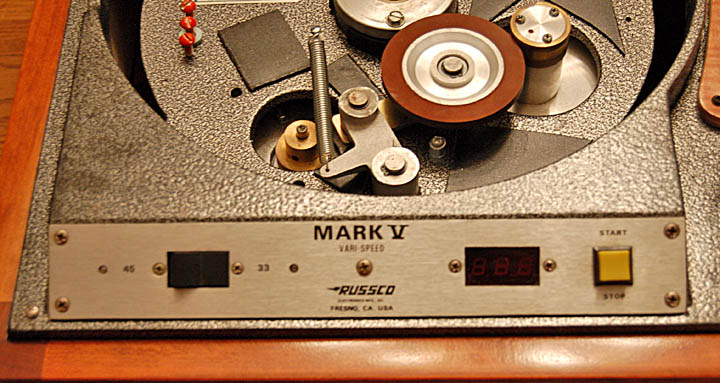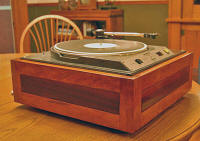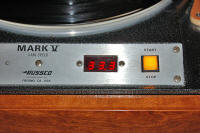-edible zone-

Here is the shortest possible version of my Russco Mark V story!
As luck would have it, while digging through a "junk room" of a
radio station near me I came upon a Russco Mark V Vari-Speed
Broadcast/Deluxe turntable in excellent condition. I was not looking for
another turntable (I had recently finished restoring a Thorens TD 150
MkII), but it really had just dropped into my lap--and at my wife’s
insistence (!) I dragged it home for a trial. After putting it on some
1X6 pine legs, a cursory cleaning/lubrication, and installing a
throw-away cartridge, I was astounded by how it sounded. Inspired by
reading about successful idler restoration projects done by others I
decided it could be worth my time to restore and plinth it.
My
good fortune continued. Through an occasional poster on the Vinyl Asylum
site I generously received an owner’s manual that also included complete
schematics and servicing information for the turntable’s mechanical and
electrical components. I was amazed at the build quality and
forethought—it appears that every aspect of the Mark V was engineered to
be serviceable (or even rebuilt). So I went through the manual item by
item, intending to do whatever was necessary to bring it back to NOS
condition, mechanically speaking at least.
The things I did upon
studying the manual included replacing the idler wheel and belt (I
experimented with o-rings of different sizes and materials when
replacing the original cracked belt); taking the motor off and
cleaning/lubricating all the bits associated with it; experimenting with
bearing lubricants; experimenting with dampening and different mats and
mat combinations, and spending a couple of hours adjusting motor phase
etc. via pots in the servo control unit and a stethoscope. I also
experimented with armboard materials, making armboards from pieces of
walnut, cherry, and maple as well as laminated ones. The best sounding
was a birch plywood armboard which I additionally veneered top and
bottom with tiger anigre. All of these tasks took place one item at a
time, listening after each project while the turntable was mounted on
its pine stilts, before I considered plinth designs.
After much hand-wringing and probably a dozen sketches I decided to
make a "Loricraft style" plinth, out of hardwood. I also wanted the
design to provide a visual foil to the industrial look of the TT so I
went with a frame-and-panel construction mostly with Pennsylvania black
cherry and some ("real," and very old) mahogany that I have. The unseen
corner blocks etc. inside of the plinth are maple and walnut. The
panels" in the frame float in their openings and do not vibrate against
the frame members.
I also spent a number of evenings
experimenting with various combinations of spikes, pads, and platforms,
finally settling on the simplest solution of just plain spikes.
Does the turntable sound better now than when it had an aluminum
armboard, and when it was sitting on pine stilts? Yes! It is so much
better than my beloved Thorens TD150 MkII that it took a few evenings of
A-B listening for me to believe how much better it is. The Russco throws
a soundstage that is subjectively 30-40% wider-taller-deeper than the
Thorens, yet the soundstage does not sound the least bit hollow or
unsorted. It is a very musical presentation with rock-solid PRaT and
wonderful bass response, yet delicate and very precise in the way that
it images within a dense orchestral texture (about 80-90% of my
listening is with orchestral repertoire). I have no sense of rumble when
listening, so I guess that my good luck continued even through the
plinth design! Every minute hearing it is a joy for me.
A
different arm may or may not be in the turntable’s future (the installed
Jelco works very well with the famous HIFI am tweak from the Audiogon
forum + a Denon DL103). I’m looking for a NOS AT arm, perhaps a 1009, or
another high mass arm from the 70s, but I’m in no hurry.
I didn’t
appreciate how few of these Russco Mk V turntables are out there until
deep into the project. The story relayed to me was that after several
years of R&D the Mark V was the last model produced by Russco as a new
flagship, and that it was designed to be the "greatest turntable in the
world" with instant starting, electronically controlled variable speed,
very low rumble, and rugged enough for continuous use. The drive system
is a hybrid "belt isolated capstan rim drive" that accelerates the
platter from 0-33.3 rpm in 26 milliseconds (about 1" of spin).
Unfortunately for the company the turntable was expensive enough (over
$1K in 1979 when it was released, without arm or plinth) that Russco
customers continued buying the "lower" model instead. This "swan song"
by Russco therefore drained resources and actually contributed to the
company’s demise, which led to its later being bought by Rek o Cut.
In closing I can report that the buzz about idler-driven turntables
proved true for me. While I appreciate having restored what has turned
out to be a rare turntable, I do wish there were more of these Russco Mk
V turntables out there--if for no other reason than that restorers could
then compare notes like the Garrard restorers have done!



